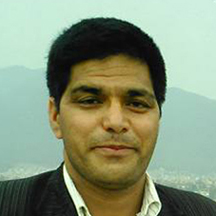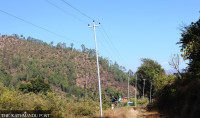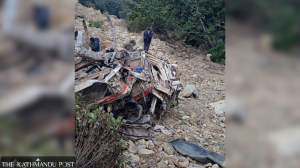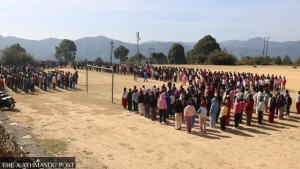Karnali Province
Mid-day meal budget misused in Kalikot
Government schools in the district say they are spending the meal money to pay salaries to privately-hired teachers.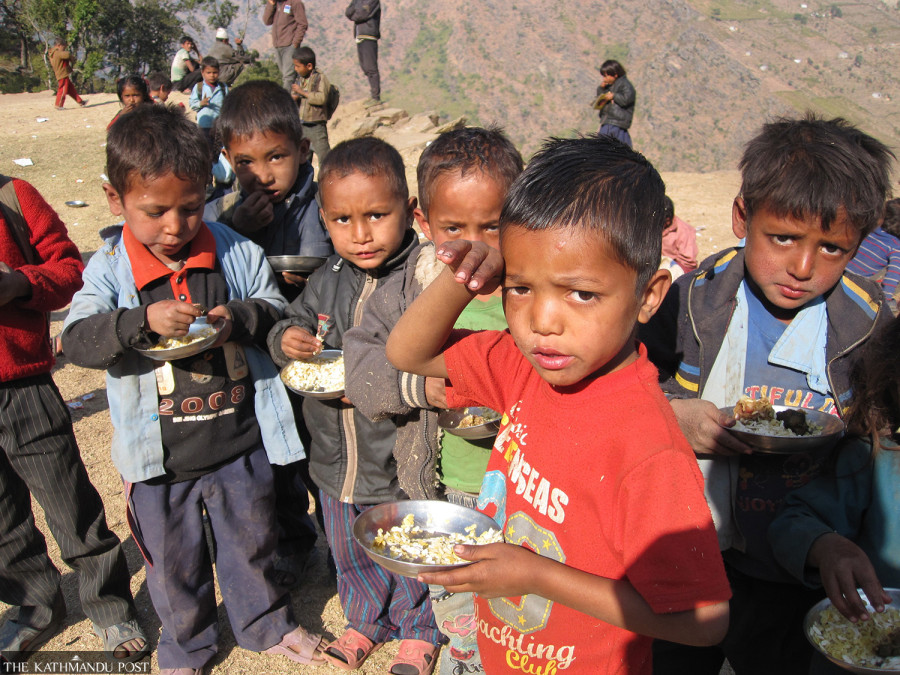
Tularam Pandey
When Man Bahadur Bishwakarma first heard about the mid-day meal programme at local schools, he was relieved because he no longer had to worry, or so he thought, about what his children would eat while in school.
But he soon learnt that his children were not getting the promised daily meal.
Already running his household on a shoestring budget, Man Bahadur said he feels dejected and let down by the system.
“I have seven children to feed. Four of them go to school so I was hoping at least they wouldn’t go hungry. But that’s not the case,” said the 41-year-old farmer from Khandachakra Municipality-4, Kalikot.
Four among seven of Man Bahadur’s children study at the local Navajyoti Basic School. His eldest daughter is an eighth grader in another school while two others are not yet of school-going age.
“I asked the school administration about it, but the school said that the money meant for mid-day meal is being spent on teachers’ salaries,” Man Bahadur said.
The mid-day meal programme was introduced in 2017 in collaboration with the World Food Programme to ensure children in community schools get a healthy, nutritious diet and control malnutrition. The programme has also been helpful to make school kids regular to their classes.
But most people from the target population are deprived of such facilities. The state also provides scholarships to the children of poor and needy people like Man Bahadur.

Community schools in Kalikot, meanwhile, say they have no alternative to using the mid-day meal budget to pay teachers since the authorities have left several teachers’ posts vacant.
“We have to hire private teachers to run the school and we have to pay them their salaries,” said Ram Bahadur Bogati, headmaster of Navajyoti Basic School. “The authorities are yet to manage teacher posts at the school, so we have to use the funds meant for the mid-day meal and scholarships to pay them.”
Navajyoti Basic School, which currently has five teachers appointed through private sources, received Rs543,720 for the mid-day meal programme in the last academic session. The entire amount was spent to provide salaries to the teachers, according to Bogati.
The federal government provides Rs20 per day to each student studying up to grade five in community schools through the local units in Karnali Province.
With this scheme, the government aims to provide a nutritious diet to children and control malnutrition in the province. The programme is also expected to reduce absenteeism among students in rural areas.
The community school mid-day meal programme is being run in 42 out of 77 districts in the country.
However, most of the community schools in remote areas have redirected the amount for mid-day meals to manage the salary of the teachers.
“We have recently dispatched letters to all community schools instructing them to prepare mid-day meal compulsorily in the school and to feed the children,” said Jasi Prasad Chaulagain, chief at the education, youth and sports unit of Khandachakra Municipality. According to him, the budget for the mid-day meal has been released for the students of grade six this year.
Khandachakra Municipality released a total of Rs1.9 million for 711 students of the child development centre and Rs11.5 million for 4,188 students studying up to grade five in the last fiscal year.
Children of Tilagupha, another municipality in Kalikot, also do not get mid-day meals at school. Ramkala Bohora, 31, a resident of Tilagupha-2, has three children studying at Durga Secondary School in Ratada. The school informed her that the amount released for the mid-day meal programme is used to manage the salaries of the teachers appointed through private sources.
There are just five teachers under the posts managed by the government in Durga Secondary School. “Secondary classes are being run somehow by appointing six teachers through a private source. The amount meant for the mid-day meal is used to provide salary to those teachers,” said Sarpalal Bohora, the headmaster.

Guardians of students at Kalika Secondary School at Khalla in Tulagupha-5 complain that their wards have been deprived of mid-day meals and scholarships for the past five years.
In this school, too, the budget released for the mid-day meal programme and scholarships are used to manage salary to the teachers appointed through private sources, according to Debilal Neupane, guardian of a student studying at the school.
Tilagupha Municipality issued Rs18 million for the mid-day meal programme in the last fiscal year. In the current fiscal, a total of Rs 26 million has been released for the programme, according to deputy Mayor Mahendra Bahadur Shahi. He urged the government to manage the teacher posts in the schools so that the educational institutions would not use the budget on paying salaries to the teachers.
According to Shahi, the local unit decided to open the bank account of each student to deposit amounts for the mid-day meal and scholarship in a bid to avoid the misuse of the amounts. “Preparations are on to deposit the scholarship and mid-day meal money directly in the student’s account,” he said.
There are a total of 294 community schools in Kalikot, a remote district in Karnali Province. The majority of the schools in all nine local units are found using the budget for the mid-day meal programme and scholarships to manage salaries for the teachers.
There are around 100 community schools in the district that do not have even a single post of government teachers.
Malnutrition is a serious health problem in all 10 districts of Karnali Province. The Multiple Indicator Survey-2019 showed that the prevalence of wasting among the children in Karnali was 17.6, the highest in the country, followed by Province 1 (14.3 percent), Sudurpaschim Province (14.1 percent), Province 2 (13.9 percent), Lumbini Province (13.7 percent), Gandaki Province (8 percent), and Bagmati Province (4.7 percent).
According to the Provincial Health Directorate in Surkhet, the majority of people in Karnali, which regularly faces food scarcity, are deprived of nutritious foods.
Kiran Adhikary, a civil society leader, said it is ironic that the schools are compelled to use the budgets for scholarship and mid-day meal programmes to provide salaries to teachers.
“The schools are doing bad work for a good purpose,” Adhikary said. “The problem will be resolved only if the government manages teacher posts in the community school.”




 20.12°C Kathmandu
20.12°C Kathmandu